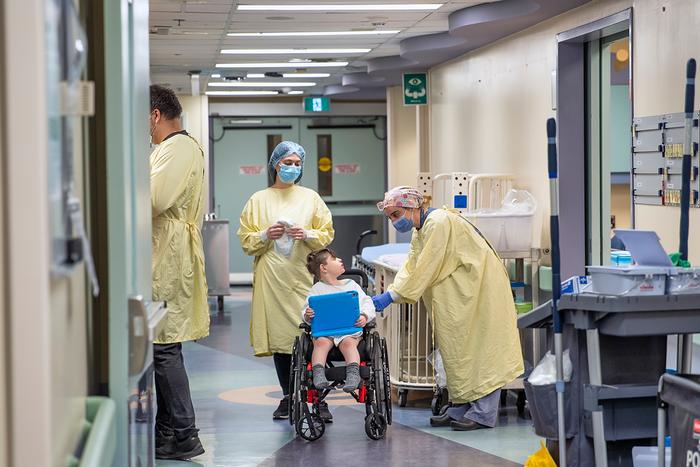
image:
Michael is checked by a nurse at SickKids before receiving gene therapy in a single-patient clinical trial for spastic paraplegia type 50 (SPG50).
view more
Credit: HOSPITAL FOR SICK (SICK) CHILDREN.
When Michael Pirovolakis received an individualized gene therapy in a single-patient clinical trial at the Hospital for Sick Children (SickKids) in March 2022, the course of his condition changed dramatically.
Michael has spastic paraplegia type 50 (SPG50), an “ultra-rare” progressive neurodegenerative disorder that causes developmental delays, speech impairment, seizures, a progressive paralysis of all four limbs and is usually fatal by adulthood. Approximately 80 children worldwide are affected by this genetic condition.
In an effort to slow the progression of the condition, a clinical research team at SickKids administered the first single-patient gene therapy to Michael less than three years after his initial diagnosis.
Today, the groundbreaking clinical trial published in Nature Medicine documents Michael’s journey in the 12 months following the procedure, along with the new impact this test has on the future of genetic medicine in Canada.
Gene therapy is a way to deliver a healthy copy of a gene into the cells of a person who has a defective gene(s). In Michael’s case, SPG50 is caused by two pathogenic variants in a gene called AP4M1.
Led by Dr. Jim Dowling, staff physician in the Division of Neurology and Senior Scientist in the Genetics and Genome Biology program at SickKids, the clinical research team delivered the healthy AP4M1 gene into Michael’s spinal fluid, which delivered the gene directly to nerve cells. .
“While these ultra-rare diseases are unique, our workflow provides a road map for gene therapies that could help many of the thousands of children in Canada with rare genetic conditions,” says Dowling.
Thanks to a multi-center collaboration with doctors and companies in the US and Canada to coordinate research, development and production of a gene replacement therapy, the team was remarkably able to administer gene therapy treatment to Michael within three years of diagnosis.
In the 12 months since receiving treatment, Michael has had no serious side effects and, contrary to the hallmark of neurodegenerative conditions such as SPG50, his condition does not appear to be progressing further.
He also began to show possible signs of improvement. For the first time, Michael was able to stand with his heels on the ground. He also experienced improvements in several aspects of his neurological development.
“When we heard that Michael had been diagnosed with this terrible disease, our world fell apart. We were lost and broken as a family,” said Michael’s parents, Terry and Georgia. “Thankfully, we had an amazing team at SickKids and a supportive community that lifted us up and gave us the confidence to raise millions of dollars and create a therapy, not just for Michael, but for other children affected by this disease for generations to come. .”
The clinical research team continues to follow Michael’s progress, but the trial provides important initial evidence of the safety and efficacy of gene therapy to reduce or stop the progression of SPG50.
Importantly, the results also highlight how gene therapy can be rapidly developed and customized for individual patients with rare genetic conditions. They hope this approach can be used for other conditions in the future to help achieve precision health in children, a move at SickKids to provide individualized care for each patient.
“There are over 10,000 individual rare diseases and most are without therapy,” says Dowling. “We are delivering a plan that, with the right funding and support, has the potential to change the lives of patients with rare diseases and a future where every child can benefit from precision medicine.”
This research was supported by the Precision Child Health initiative at SickKids and the SickKids Foundation. Funding from the CureSPG50 Foundation supported the development of the therapy, including manufacturing and preparation.
Title of the article
AAV gene therapy for hereditary spastic paraplegia type 50: a single patient phase 1 trial
The publication date of the article
28-June-2024
Disclaimer: AAAS and EurekAlert! are not responsible for the accuracy of the news posted on EurekAlert! contributing institutions or for using any information through the EurekAlert system.
#Gene #therapy #halts #progression #rare #genetic #condition #young #boy
Image Source : www.eurekalert.org
